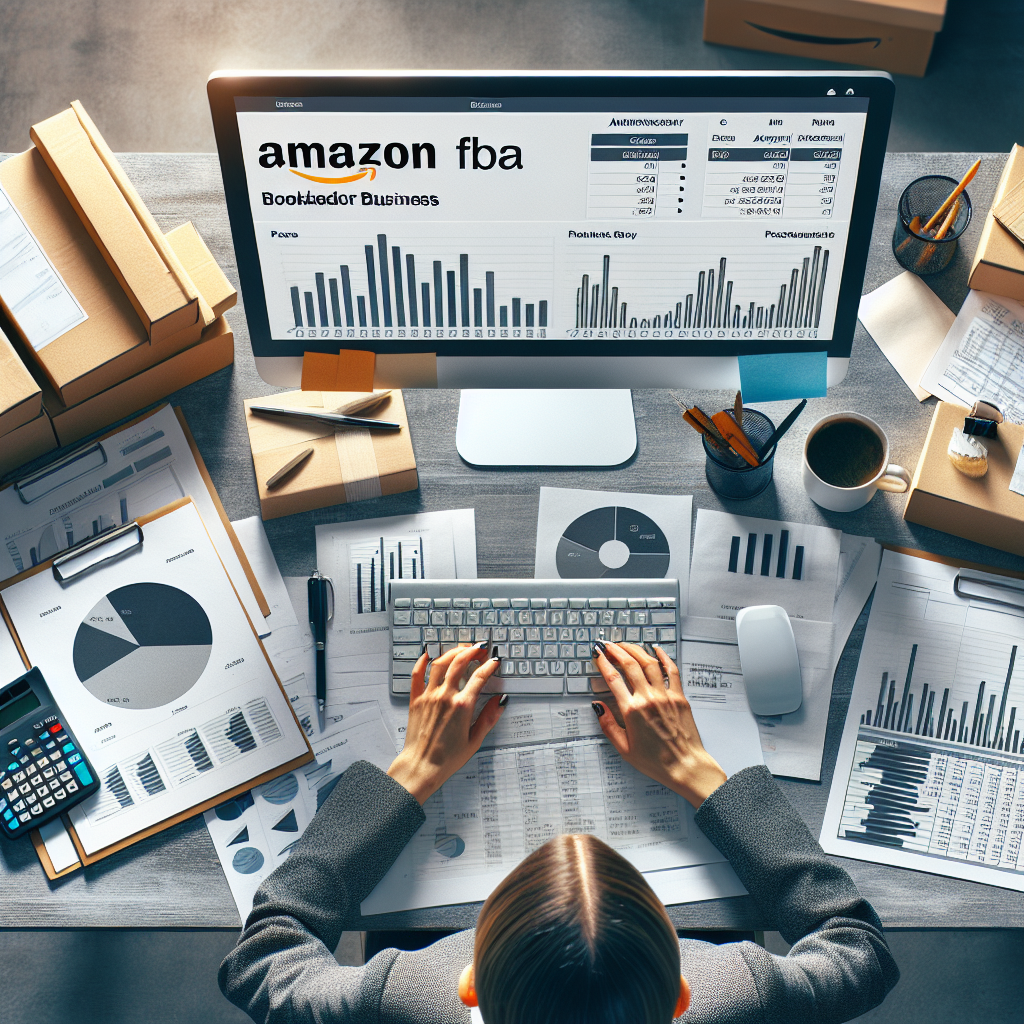Amazon Seller Accounting in 2023: How to Get Started
As an Amazon seller, managing your finances effectively is crucial for the success and growth of your business. This blog post delves into the unique financial and transactional aspects of running an Amazon business, including tracking sales, managing inventory, handling Amazon fees, and dealing with tax obligations. We'll also distinguish between Amazon accounting and Amazon bookkeeping, and explore the importance of both in maintaining the financial health of your business. We'll discuss the challenges of managing Amazon business accounts, the benefits of automated Amazon accounting software, and provide a step-by-step guide on how to do Amazon accounting. Whether you're a seasoned seller or just starting out, this guide will equip you with the knowledge and tools to streamline your Amazon accounting processes and make strategic business decisions based on financial data.
Amazon seller accounting is crucial for tracking sales, managing inventory, handling Amazon fees, and ensuring tax compliance, which are all vital for maintaining the financial health of your business.
Automated accounting solutions, like Link My Books, can significantly simplify the accounting process, save time, reduce errors, and provide valuable business insights.
Implementing regular financial checks, strategic tax planning, and consistent financial analysis are essential steps for maintaining accurate Amazon seller accounting and making data-driven business decisions.
What is Amazon Accounting?
Amazon accounting is a specialised area of accounting that focuses on the unique financial and transactional aspects of running an Amazon business. This includes tracking sales, managing inventory, handling Amazon fees, and dealing with tax obligations. It's a crucial part of accounting for Amazon sellers, ensuring that your business remains financially healthy and compliant with tax laws.
Amazon Accounting vs Amazon Bookkeeping
The main difference between Amazon accounting and Amazon bookkeeping is that bookkeeping involves the day-to-day recording of financial transactions, while accounting is a broader term that includes the interpretation, classification, analysis, reporting, and summarization of financial data. In other words, bookkeeping is the foundation upon which accounting is built. Bookkeeping for Amazon sellers involves recording every financial transaction, including sales, returns, and fees. On the other hand, Amazon seller accounting involves analysing this data, making financial forecasts, filing tax returns, and making strategic business decisions based on financial data.
| Amazon Accounting | Amazon Bookkeeping | |
|---|---|---|
| Definition | Interpretation and analysis of financial data | Recording of daily financial transactions |
| Focus | Strategic decision-making and tax filing | Tracking sales, returns, and fees |
| Role | Guides business strategy and forecasts | Provides foundational data |
What does Amazon accounting involve?
Sales
Sales tracking is the process of recording and monitoring all the sales transactions that occur in your Amazon business. This includes tracking each sale, the price at which each item was sold, and the total revenue generated. It's crucial for understanding your business's profitability and for calculating taxes.
FBA Business Fees
Amazon FBA accounting involves tracking the fees associated with Amazon's fulfilment by Amazon (FBA) program. These fees include storage fees for keeping your products in Amazon's warehouses and fulfilment fees for Amazon's picking, packing, and shipping services. Accurate tracking of these fees is essential for understanding your business's overall expenses and profitability.
Amazon selling fees and other fees
In addition to FBA fees, Amazon charges various seller fees, including referral fees (a percentage of each sale), closing fees, and high-volume listing fees. Tracking these fees accurately is crucial for understanding your total expenses and for calculating your net profit.
Reimbursements for returns
Amazon provides reimbursements for returned items, and these need to be accurately tracked in your accounting system. This includes tracking the number of returns, the reasons for the returns, and the total amount reimbursed.
Settlements or disbursements
Amazon pays sellers every two weeks, and these payments, known as settlements or disbursements, need to be accurately recorded in your accounting system. This covers tracking the total amount received and any fees or charges deducted by Amazon.
VAT, GST, sales tax and other taxes
As an Amazon seller, you're responsible for collecting and remitting various taxes, including Value Added Tax (VAT), Goods and Services Tax (GST), and sales tax. These taxes need to be accurately tracked and reported in your accounting system. You're also at times entitled to an Amazon VAT refund, which can be a nice windfall.
Other aspects of Amazon seller accounting include:
- Inventory costs: for Amazon sellers include the cost of purchasing products, storage fees for keeping your products in Amazon's warehouses, and costs related to shipping and handling.
- Payroll Expenses: Involves tracking all expenses related to employee compensation, including wages, salaries, bonuses, and benefits.
- Owner's Equity: Refers to the owner's investment in the business. It's calculated as the difference between the business's total assets and its total liabilities.
- Other Expenses or Income: Includes any other costs or income related to your business, such as interest expenses, rental income, or gains from the sale of assets.
Why Amazon accounting is vital for sellers
Compliance with Tax Laws
Accurate Amazon seller accounting is crucial for complying with tax laws. By accurately tracking sales, expenses, and taxes, you can ensure that you're paying the correct amount of tax and avoiding penalties for underpayment or late payment.
Understanding Your Business's Financial Health
Amazon accounting provides crucial insights into your business's financial health. By tracking sales, expenses, and profitability, you can make informed decisions about pricing, inventory management, and business growth.
Planning for the Future
With accurate accounting information, you can make strategic decisions about your business's future. This includes planning for growth, identifying areas for cost savings, and making informed decisions about potential investments.
The Challenges with Managing Amazon Business Accounts
Volume of Data
Amazon seller accounting is very different from traditional point of sales systems that a brick-and-mortar company may have. Amazon fees are complicated and varied and require accurate categorization to track. Many of the essential accounting software solutions small businesses use cannot handle the number of transactions and specificity associated with an ecommerce business running on Amazon.
Returns
Returns are a common occurrence in the Amazon marketplace. They can significantly impact your bottom line and complicate your accounting process. You need to track returns accurately to ensure you're accounting for the loss in sales and the potential reimbursement from Amazon.
Tax Liability
As an Amazon seller, you're responsible for collecting and remitting various taxes, including sales tax, VAT, and GST. VAT on Amazon fees can be complex, especially if you're selling in multiple countries or states with different tax rates and rules.
Fees
Amazon charges a variety of fees, including FBA fees, referral fees, and high-volume listing fees. These fees can be complex and varied, making them challenging to track accurately.
Inventory Management
Inventory management is a significant challenge for Amazon sellers. You need to track the cost of goods sold (COGS), manage inventory levels, and account for inventory storage costs. This requires a robust accounting system that can handle the complexities of ecommerce inventory management.
eCommerce accounting Methods: Manual vs Automated
| Manual Accounting | Automated Accounting | |
|---|---|---|
| Definition | Manual entry and tracking of financial transactions | Software-assisted tracking and reporting of transactions |
| Efficiency | Time-consuming and prone to human error | Saves time and reduced errors |
| Scalability | Less scalable, more effort as as business grows | Highly scalable, handles increased data flow effortlessly |
| Suitability | Suitable for small business with fewer transactions | Ideal for business of all sizes, especially businesses with high transaction volume |
How to do bookkeeping for Amazon sellers
Understand Your Business's Financial Needs
Choose an Accounting Software
Integrate with an Automation Tool
Regular Review and Update of Accounts
Plan for Taxes
Regular Financial Analysis
Getting started with Amazon FBA accounting might seem overwhelming, especially given the unique challenges and intricacies of the Amazon landscape. However, with the right approach, the process can be manageable and even empowering. Here is a more detailed step-by-step guide on how to do Amazon accounting:
- Understand Your Business's Financial Needs
- Choose an Accounting Software
- Integrate with an Automation Tool
- Regular Review and Update of Accounts
- Plan for Taxes
- Regular Financial Analysis
The benefits of automated Amazon accounting software
Automated accounting solutions save time
Automated accounting solutions reduce human error
Automated accounting solutions save money
Automated accounting solutions stop you overpaying tax
Automated accounting solutions provide valuable insights
Automated accounting solutions make it easier to file your taxes
Automated accounting solutions are safer
Best Accounting Tools For Amazon Businesses
When it comes to managing the finances of an Amazon business, two of the most best Amazon accounting software options are Xero and QuickBooks. Both of these tools offer a range of features that can help Amazon sellers streamline their accounting processes, manage their finances more effectively, and gain valuable insights into their business performance.
How Link my Books makes FBA accounting simple
Link My Books is a software solution that simplifies fulfilment by Amazon (FBA) accounting by automating many of the tasks associated with bookkeeping and financial management.
Extra tips on how to do Amazon seller accounting
Choose the Right Accounting Method
Separate Personal and Business Finances
Use Accounting Software
Maintain Organised Accounts
Perform Regular Checks
Set Aside Time
Ensure Tax Compliance
Utilise Free Resources
By implementing these tips, you can make your Amazon seller accounting process more efficient, saving time and money, and ultimately boosting your business's profitability.
Key financial reports to know
Profit & Loss Statement
Balance Sheet
Cash Flow Statement
Key financial metrics to know
Cost of Goods Sold (COGS)
Gross Margin
Inventory Turnover
FAQ
How do I get the data I need from Amazon Seller Central?
What accounting system does Amazon use?
Do you need a business account to be an Amazon seller?
Make Amazon accounting fast, easy and accurate
Transform your Amazon accounting with Link My Books! Our powerful tool seamlessly syncs your ecommerce sales data with your accounting software.
From tracking your COGS to handling multi-currency transactions and managing sales tax, Link My Books has got you covered.
Let us simplify your ecommerce accounting process so you can dedicate more time to growing your business. Why waste hours managing accounts manually when you can automate it with ease?
Experience the difference today by trying Link My Books! Start your free trial now and witness how our solution revolutionises your Amazon accounting.



